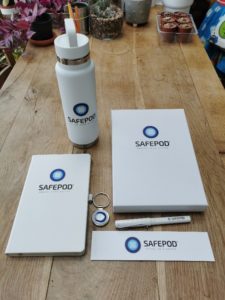 The SafePod Network is a brand new way to access secure data. We asked Sarah Knight, one of our #DataImpactFellows, to find out more. Today in the final post in her mini-series, Sarah looks at why the SafePod Network is a positive innovation for researchers.
The SafePod Network is a brand new way to access secure data. We asked Sarah Knight, one of our #DataImpactFellows, to find out more. Today in the final post in her mini-series, Sarah looks at why the SafePod Network is a positive innovation for researchers.
According to the SafePod Network website, the SPN key benefits for researchers are:
Encouraging research by removing existing barriers to accessing secure data, such a geographical and cost barriers,
- Allows access to data from different data centres in one place,
- A dedicated, quiet, and comfortable environment to work in,
- Supports remote and local access to data, and
- An easy-to-use booking system.
There are also many benefits for the data centres and SafePod organisations themselves, including a safe and cost-effective solution for data sharing, and consistent security, governance, and controls.
Broader implications for data access
Improved research outputs
Accessing secure data for research allows us to tackle questions that are not possible without them.
In my research, having access to highly precise spatial information about where people live allows me to better estimate individuals’ exposure to their natural environment and neighbourhoods.
Without this level of precision, we are left with approximations, aggregations, and exposure misclassification, which are known to potentially introduce error in our findings. Not cool!
Improved research productivity
Providing a local point to access secure data means that, for researchers, we can create research findings, and therefore outputs, more quickly.
Accessing data from different data centres in one location is efficient and enables exciting new data linkages.
Knowing there is equitable access to high computing power on your doorstep is also extremely empowering.
Improved evidence for decision-making
Improving the quality, range, and efficiency of research outputs ultimately leads to improved evidence for policy and practice, enabling decision-makers to better deliver interventions for the public good.
A word from the SafePod Network manager
I asked Darren Lightfoot, the SafePod Network manager for his thoughts:
‘It is great to read about Sarah’s positive experience of using a SafePod to access her research data. I hope the SafePod Network will be of benefit to many more researchers across the UK to provide equitable access to data and help vital research for the public good.
The SafePod Network went live in September 2021 and has come a long way since its launch. We have grown the number of SafePods available to book from 5 to 15, and this is set to hit 24 by the end of the 2022.
We are supporting researchers to access and use SafePods and one of our key objectives was to remove geographical barriers for researchers to be able to access data through the provision of SafePods across the UK.
I am delighted to say that each month we are increasing the number of researchers registering with the network and booking SafePods to access data for their research. There are now also over 100 trained SafePod Coordinators in the UK that provide the operational management for SafePods.
We are also engaging with more organisations to provide access to their data through the SafePod Network too.
Furthermore, I am pleased to announce that the SafePod Network will be participating in the International Population Data Linkage Network conference later this year and demonstrating some of our services to improve access to data.
Please feel free to get in touch with me if you would like to find out more information about the SafePod Network. I can be contacted on 01334 463901 or email safepodnetwork@st-andrews.ac.uk.’

And finally…
Improving the access to, and use of, secure data for research through the SafePod network allows us to feel confident in the integrity of our research outputs.
By developing sophisticated techniques and systems, secure data environments ensure that our outputs are non-disclosive, meaning individuals cannot be directly, or indirectly, identified.
This allows us as researchers to feel confident that our outputs meet the necessary ethical (and statistical) obligations of our organisations, our funders, and of society.
In a world of increasing data availability, and the production and use of Big Data such as our movements, our transactions, and our preferences, feeling confident in the integrity of research has never been more important.
So go ahead, book your local SafePod.
I would recommend using a SafePod to anyone who is interested in using secure data in their research.
It will benefit yourself as a researcher and the impact of your work!
Follow @SafePodNetwork on Twitter
About the author
Sarah is an ESRC Postdoctoral Fellow at the Environment & Geography department, University of York investigating the links between socioeconomic and environmental inequalities and nature connectedness.
Specialising in nature-society relationships and geospatial approaches, Sarah is interested in employing quantitative, qualitative and participatory methods to study GIS, green and blue spaces, health & well-being inequalities & ecology. She has worked on several projects at York such as a Green Social Prescribing evaluation and the EU-funded H2020 PERICLES project. Sarah completed an ESRC White Rose funded PhD in 2020 on measuring the relationship between the natural environment and subjective well-being. This involved using regression methods to explore the determinants of human well-being from green/bluespace, air pollution, and biodiversity datasets at small-scale UK geographies. Prior to joining York, she worked in the environmental conservation sector for nearly 10 years in organisations such as UNEP-WCMC, FERA and ZSL.
